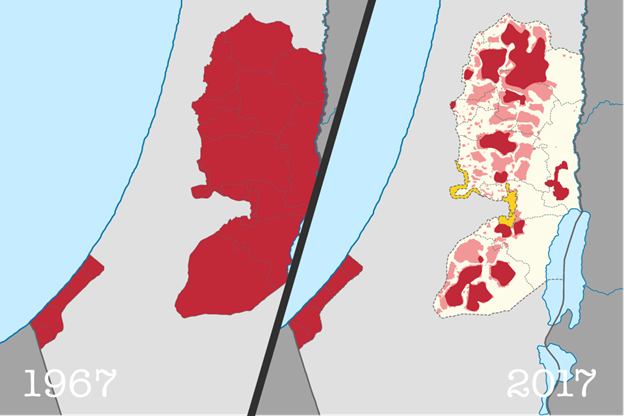
After Hamas’s heinous attack on Israel, President Biden – wisely – has been talking about peace in the Mideast, even as hostilities rage in Gaza, the West Bank and at the Israel-Lebanese border . Without a peace settlement, these hostilities are open-ended, as they have been for decades. Yet, Biden has resurrected the old idea of a Palestinian state under the Palestinian Authority. That plan is a dead letter. Instead, we should try an entirely new approach, a permanent international protectorate on the West Bank.
The protectorate would be established and governed by a multinational coalition which would take control of the West Bank and demilitarize it completely, replacing Israel Defense Forces with international peacekeeping troops.
The Palestinian state is a casualty of two realities. First, Israel could never accept a fully sovereign Palestinian state on the West Bank high above Israel which is but six miles wide at its narrowest point. That would be an unacceptable existential risk for the Jewish state.
Nor would the Palestinians accept the emasculated version of a state contemplated in failed negotiations to date, a small demilitarized entity with IDF troops stationed on all its borders. That would be little different from the current status quo. Peace negotiations over the years have bogged down in fatally complex detail in attempts to square the circle of these irreconcilable positions.
The protectorate would not satisfy either party. Yet, in a paradoxical manner, it would. The second-best thing to achieving your primary objective is to deny your enemy his. The protectorate would deny Palestinians an independent state, and it would deny Israel annexation of the territory and any IDF presence.
The U.S. should take the initiative to form the coalition and establish the protectorate. Yet, the effort would require a major Arab co-sponsor and a broad coalition. The logical co-sponsor would be Saudi Arabia, which has been close to normalizing relations with Israel.
Other Arab and non-Arab candidates would include Egypt and Jordan which already have peace treaties with Israel, and Great Britain and France, which have historical ties to the region, as well as the signers of the Abraham Accords. Ideally, other nations outside the region would join and contribute peacekeeping troops. India comes to mind. It is the third largest provider of troops to U.N. peacekeeping missions.
It would fall to the U.S. as Israel’s closest ally and ultimate guarantor to convince the Jewish State to yield control of the territory. No small task, since Israel exercises absolute control over about 60% of the West Bank (“Area C” under the Oslo Accords) where there is no Palestinian enfranchisement whatsoever. Moreover, right-wing Israelis have been busy creating “facts on the ground” in order to claim the whole territory permanently.
Since Israel’s founding in 1948, if not since the 1917 Balfour Declaration calling for a Jewish homeland, constant violence has prevented a solution, and the absence of a solution has perpetuated the violence on an open ended basis.
It is obvious that the two sides themselves cannot negotiate peace, nor can they trust each other to maintain peace. The only option remaining is an externally imposed solution. Thus, the proposal for the protectorate.
For Israel, it would eliminate a potential existential threat next door. For the Palestinians, it would end completely the hated occupation. Even the hardline former Israeli Premier, Ariel Sharon, called the Israeli presence an occupation and was expected to call for a major withdrawal of settlers from the West Bank before he suffered an incapacitating stroke.
For West Bank residents, Jew and Palestinian, it would offer domestic calm. Just as Palestinian citizens live as a minority in Israel, Jews should be able to live as a minority on the West Bank. No one would be required or pressured to leave. Iran and other actors who seek to eliminate the Jewish state would face the military power of the entire protectorate coalition, arguably a sufficient deterrent.
Naturally, the challenge is in the details, starting with the borders of the protectorate. Yet, the 1967 borders have been the basis for negotiations under the ill-fated Oslo Accords, so they should be an acceptable starting point. The issues of land rights and a Palestinian right of return would be incredibly difficult. Yet, the decisions of the protectorate officials would carry the inherent legitimacy of a broad multinational coalition.
The proposed protectorate might risk recurrence of the experience under the British Mandate, when extremists on both sides targeted the British peacekeepers. Future Israeli Premier Menachem Begin was a mastermind of the 1946 bombing of the King David Hotel, the British headquarters, resulting in 91 lives lost. Yet, the terrorist acts were designed to influence the outcome after the Mandate. In contrast, the protectorate itself would be the permanent outcome, so there should be less reason to attack the peacekeepers.
As the ultimate guarantor of the Jewish state, the U.S. has a national interest in a solution which leads to lasting peace. Without a peace settlement, the cycle of violence has continued, if not escalated, and every serious spike in violence risks the U.S being dragged into a wider regional conflict, which itself would entail even greater risks. Those risks are elevated today. The pursuit of a feasible peace plan should not be deferred any longer. Israel’s best defense is peace, not trying to eradicate its enemies.
![]()
Red Jahncke is a nationally recognized columnist, who writes about politics and policy. His columns appear in numerous national publications, such as The Wall Street Journal, Bloomberg, USA Today, The Hill, Issues & Insights and National Review as well as many Connecticut newspapers.





